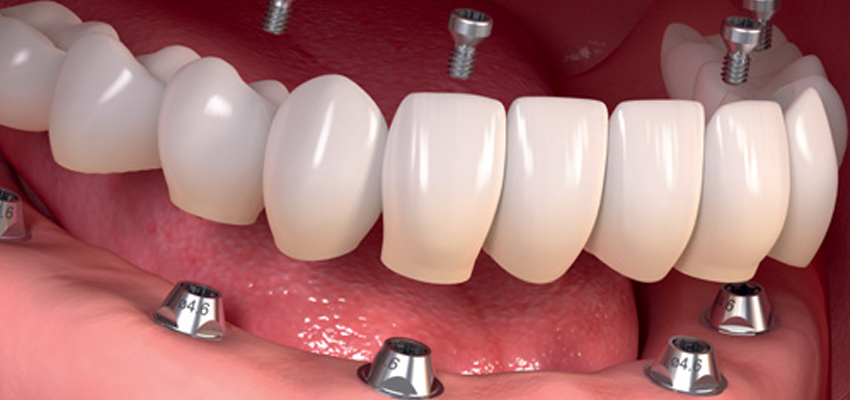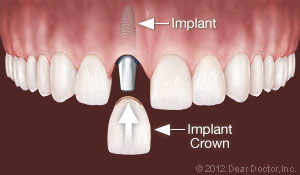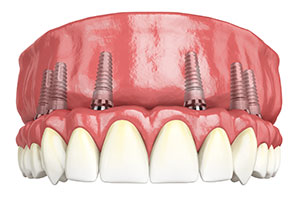
A dental implant is actually a replacement for the root or roots of a tooth. Like tooth roots, dental implants are secured in the jawbone and are not visible once surgically placed. They are used to secure crowns (the parts of teeth seen in the mouth), bridgework or dentures by a variety of means.
Dental implants are usually made of titanium, which is lightweight, strong and biocompatible, which means that it is accepted by the body. Titanium and titanium alloys are the most widely used metals in both dental and other bone implants, such as orthopedic joint replacements.
Dental implants have the highest success rate of any implanted surgical device.
Dental implants help you eat, chew, smile, talk and look completely natural. This functionality imparts social, psychological and physical well-being.
If you are missing one or more of your natural teeth, you may benefit from dental implants:
Generally speaking, if you have lost teeth you are a candidate for dental implants. It is important that you are in good health, however, as there are some conditions and diseases that can affect whether dental implants are right for you.
For example, uncontrolled diabetes, cancer, radiation to the jaws, smoking, alcoholism, or uncontrolled periodontal (gum) disease may affect whether dental implants will fuse to your bone. It is important to let your dental surgeon know all about your entire medical history so they can make informed decisions.
Immediately (at the same time an implant is placed) or after a period of healing, an abutment is attached to the implant. This is a device that “abuts” or joins the implant to a tooth form called a crown, which replaces the tooth part you see in the mouth. It will hold a custom-made crown that the dental laboratory will fabricate and match to your existing teeth.
The custom crown is cemented or screwed onto the abutment to permanently keep it in place. Once the crown is in place, it should be indistinguishable from your natural teeth.

As with single tooth replacement, temporary healing caps or abutments may be placed on multiple implants until the healing phase is complete. After healing, permanent abutments are attached to the implants.
They can attach to custom-made crowns or bridgework that a dental laboratory will fabricate to match your existing teeth. In the final step, the custom bridge, which will replace multiple teeth, is cemented or screwed onto the abutments.
The teeth have been replaced without disturbing the healthy teeth next to them, and bone loss has been halted.

If all of your lower teeth are missing, depending on the design of the removable restoration, two to six implants may be used to support a lower denture. If all of your upper teeth are missing, a minimum of four implants may be used to support an upper denture. Removable dentures are often used to replace extensive tooth, bone and gum-tissue loss, thus providing support for the facial skeleton, lip and cheeks.
A new denture can have attachments that snap or clip it into place on the implants or a custom made, milled bar can be fabricated to create additional strength and support for the restoration. Design variations are often related to your bone density and number of implants present; your dentist will discuss these options during your consultation. A significant advantage of a removable denture is facilitating the cleaning of the dental implants.
Q: Is The Surgery To Place a Dental Implant Painful?
A: No, it is usually done under local anesthesia in the dental clinic, in just the same way as a filling. Once the anesthesia takes effect, you shouldn’t feel anything.
Q: What Can I Expect After The Anesthesia Wears Off?
A: Generally there are no open wounds with implant surgery so healing is quite quick and un-eventful. You can expect some minor discomfort, but that can generally be managed with normal pain-killers.
Q: How Long Does It Take To Place Dental Implants?
A: It depends on the number and location of the implants, but simple, uncomplicated dental implant placement usually takes less than an hour.
A: It Depends On The Number And Location Of The Implants, But Simple, Uncomplicated Dental Implant Placement Usually Takes Less Than An Hour.
Q: What About Eating After Implant Surgery?
A: It’s generally important to avoid exposing any recent surgical site in the mouth to food if possible. A good rule of thumb is to eat soft, nutritious foods and keep well hydrated. We will recommend a diet and instructions on how to care for your new implants during healing.
Q: How Long Does Healing And Construction Of The Replacement Teeth (Implant Crowns) Take?
A: The entire process usually takes about two to nine months, depending on your treatment plan. There are two main phases: First the implants have to heal by fusing to the bone, and then the tooth replacement restorations have to be fabricated and attached.
Q: How Long Do Dental Implants Last?
A: Once a dental implant has fused to the bone successfully and it is functional, it should last many years if cared for properly. Many implants have now been in place for more than 50 years.
Q: Are Dental Implants Expensive?
A: Expense is always relative. For example, dental implants may be a little more expensive than fixed bridgework to place initially, but since they last so much longer, over time they are much more cost-effective.